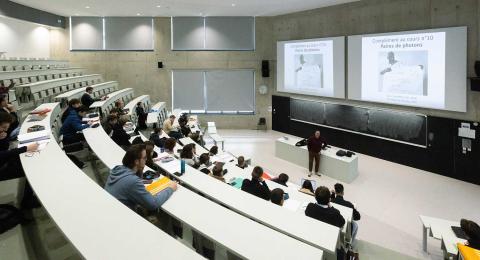Nutrition and Food Science
Adopting a healthy and sustainable diet will reduce its environmental impact while contributing to the health of individuals and populations. To achieve this, we need to be able to innovate by designing and producing foods that are more respectful of the environment, healthy, safe, appreciated by consumers and accessible to all, and to assess the complex links between exposome, diet and health. The NSA Master's programme will provide the skills needed to address these challenges.
The Master programme comprises two tracks:
- a national track with a common M1 and 5 M2 pathways: ARSA (Food Safety Risk Analysis), MGB (Microbiology and Biological Engineering), IPP (Process Product Engineering), NS (Nutrition Health), TES (Health Exposome Toxicology).
- an international track (M1 + M2) FIPDes (Food innovation and product design, Erasmus Mundus / Erasmus +).
All courses are available as initial training programmes, and some are available through apprenticeships : M1 NSA, M2 ARSA, M2 IPP, M2 NS, M2 MGB).
Information
Master’s Year 1
Master’s Year 2
Skills
- Acquire and apply fundamental and specialist knowledge
- Design and/or conduct a scientific approach to produce and analyse data
- Understand and integrate the various issues (economic, social and environmental)
- Produce a scientific synthesis and communicate
- Act in a professional environment
Learning outcome targets
The ‘Nutrition and Food Science’ Master's programme addresses recent scientific and methodological issues relating to food design and formulation, food processing, the link between food and health, nutrition, health risk analysis and toxicology relating to food and the environment. It is part of a transition towards food with less environmental impact, which must nevertheless be healthy, safe, appreciated and accessible to all.
The aim of the Master's programme is to guide students towards the commercial and industrial sectors involved in these issues, as well as towards research, control and evaluation. By the end of the course, students should have acquired a core of knowledge and skills in the field of food science and engineering, of agro-resources valorization and of the link food/nutrition/health, enabling them to become operational research managers in companies and public organisations, in associative and private organisations, or to apply for a PhD in a disciplinary or multidisciplinary field related to one of these sectors.
The learning objectives targeted by the specialisation are as follows:
- Mobilise specialised knowledge in the fundamental disciplines of nutrition and food science: genetics, microbiology, biochemistry, physiology, nutrition, chemistry, physical chemistry, process engineering, statistics.
- Master the experimental tools (laboratory and pilot scales), digital tools, and information and communication tools available to scientists for conducting research in the field of nutrition and food science.
- Identify, select, and critically analyse specialised resources in the field of nutrition and food science to document a subject and synthesise data for use.
- Lead a project, in a collaborative setting, drawing on disciplinary or multidisciplinary skills: identify an issue, construct and develop a methodological approach, acquire data through experimentation, process data, interpret results, prepare a summary, and propose perspectives.
- Conduct a critical, reflective analysis that takes into account the challenges, issues and complexity of a situation in order to propose appropriate and/or innovative solutions in accordance with current recommendations and regulations in the field of food, nutrition and food science.
- Solve problems to develop new knowledge and methodologies in the global context of food transitions and, more broadly, ecological transition.
- Communicate orally and in writing, in French and English, in presentations and discussions with a variety of audiences (scientists, professionals, the general public).
- Integrate into a professional environment: identify and communicate one's skills, situate a company or organisation in its socio-economic context, identify key contacts and the various functions within an organisation, situate oneself in a hierarchical and functional environment, and comply with procedures, legislation and safety standards.
The NSA Master's programme is a research-based course organised around a variety of educational activities: lectures, conferences, tutorials, practical work, bibliographic and experimental projects, serious games, internships or company assignments.
The main laboratories supporting the programme are Joint Research Units INRAE/AgroParisTech/Université Paris-Saclay: SayFood (Paris-Saclay Food and Bioproduct Engineering), PNCA (Physiologie de la Nutrition et du Comportement Alimentaire) and MICALIS Institute. There is also a strong collaboration with ANSES.
Target audience
The initial qualifications required to enter the M1 programme are bachelor's degrees in chemistry, life sciences, life and earth sciences, and health sciences.
- Prerequisites for M1: solid foundations in biology, biochemistry, chemistry, statistics and/or agri-food and/or nutrition and dietetics.
To enter the M2 programme, students must have completed an M1 or equivalent (engineers, doctors, pharmacists, etc.) in these disciplines.
* Prerequisites for M2 ARSA: solid foundations in general microbiology and food microbiology, and chemical analysis.
* Prerequisites for M2 IPP: solid foundations in chemistry, physics, biology and/or training in the agri-food sector.
* Prerequisites for M2 MGB: solid foundations in microbiology, virology (biodiversity, genetics and microbial physiology), genomics, biochemistry, molecular and cellular biology and/or microbial biotechnology.
* Prerequisites for M2 NS: solid foundation in biology and/or nutrition and dietetics, basic knowledge of statistics.
* Prerequisites for M2 TES: basic knowledge of cell biology, chemistry and biostatistics.
The initial qualifications required to enter the FIPDes M1 programme are:
* Bachelor's degree or equivalent (at least 180 ECTS) in food science and technology, biotechnology, process engineering, biochemistry, nutrition or food-related fields with a number of prerequisites (chemistry, biotechnology, process technology/engineering, biochemistry, mathematics, statistics), representing at least three years of study at a foreign higher education institution.
* Motivation for an international university experience.
* Level B2 in English.








